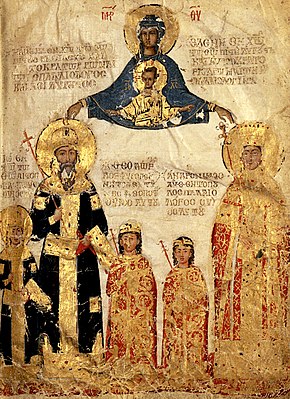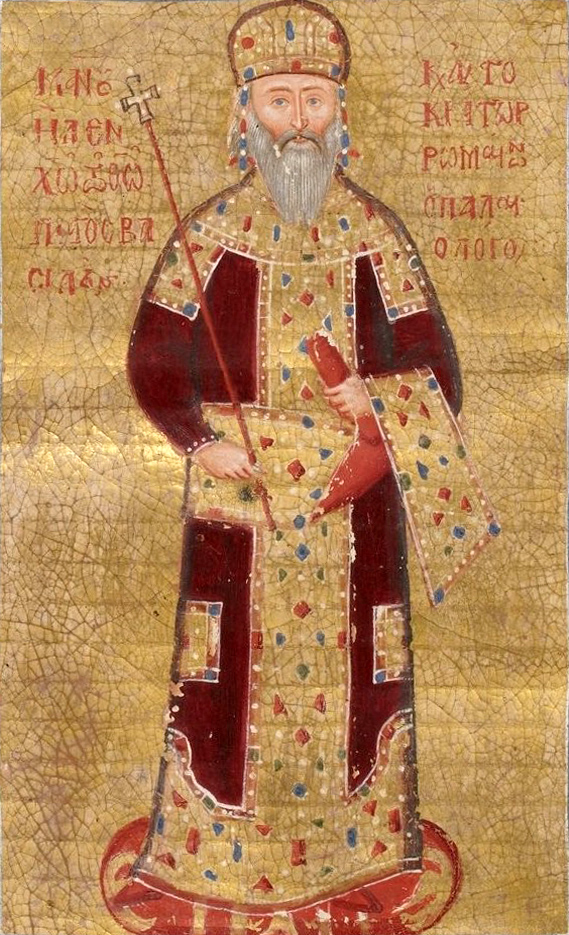Manuel II (Byzantium)
Manuel II. Palaiologos ( Middle Greek Μανουὴλ Βʹ Παλαιολόγος , * June 27, 1350 ; † July 21, 1425 ) was Byzantine emperor in Constantinople from 1391 to 1425 as the successor to his father John V. He was married to the Serbian princess Helena Dragaš . His dialogue with a Persian scholar about the connection between religion and reason, quoted in the Regensburg speech of Pope Benedict XVI. on September 12, 2006, gained worldwide fame.
Life

Manuel was a grandson of Emperor Johannes Kantakuzenos (approx. 1295-1383, Emperor 1347-1354). He began his career in 1369 as the regent of Thessaloniki , the second capital of the Byzantine Empire, which at that time had become an Ottoman vassal state . Manuel therefore had to repeatedly serve the Ottomans personally in their campaigns, for example in 1390 with the conquest of Philadelphia (today Alaşehir ) in the interior of Western Asia Minor, the last Greco-Byzantine possession in Asia Minor (if one disregards the empire Trebizond , which was independent of Constantinople ). The active participation in their conquest was therefore a special kind of humiliation for Manuel, as Steven Runciman writes in his work The Fall of Constantinople 1453 . After the death of John V in February 1391, Manuel was able to flee from the Sultan's camp and took over the business of government in Constantinople.
From May 1391 to February 1392 he was again obliged to serve against the small Turkish empires in Asia Minor. In the summer of 1392 there was a political break with the Ottomans. They then conquered Thessaloniki and began the siege of Constantinople in 1394. A Franco-Hungarian crusade led by the Hungarian king (and later Roman-German emperor) Sigismund to relieve the city failed in 1396 at Nikopolis .
Therefore, after five years of siege, Manuel undertook an extensive, multi-year trip to Europe from 1399, which took him to Venice , Avignon , Paris and London , where he was based on his intellectual abilities and education - at that time rather an exception under rulers - and with his delegation from Greece Scholars left a lasting impression that further spurred the emerging renaissance in Western Europe.
In contrast to the begging trips of earlier emperors, Manuel did not offer a church union in return for Western help. On the one hand, this was done out of genuine religious conviction, on the other hand, Manuel Realpolitiker was enough to recognize that the majority of Orthodox Christians would not follow a union anyway. The sultan's turban rather than the pope's tiara was a household word in Orthodoxy at the time and clearly showed the broken relationship between the two Christian denominations.
As a success of his visit, Manuel received mostly only kind words and extremely courteous treatment, but practically no military aid against Sultan Bayezid I. During his absence, his nephew John VII ran the business of government.
Unexpected help came with the Mongol storm under Timur . The Ottomans were defeated near Ankara in 1402 and Bāyezīd was captured. After his death in captivity (1403) broke the Ottoman Empire throne turmoil from. When the Ottoman defeat became known, Manuel immediately returned from Paris to Constantinople, where he probably returned in 1403. He maneuvered diplomatically skillfully during the interregnum and was able to regain control of Thessaloniki and parts of the western Black Sea coast to the bay of Burgas (with the cities of Sosopolis , Anchialos and Mesemvria ) in the north in return for Byzantine aid. In addition, the tribute payments and the obligation to follow the army against the Ottomans were lifted. An alliance with Serbia , his wife's country, gave him new political freedom of movement.
Manuel was friends with Sultan Mehmed I , who emerged victorious from the Ottoman interregnum in 1413. In gratitude for Manuel's help, Mehmed renounced any Ottoman pressure against Constantinople until his death in 1421 . Manuel used this breathing space to expand the fortifications of his few remaining possessions and had the fortification wall called Hexamilion repaired at Corinth , which was supposed to seal off the Peloponnese peninsula from the mainland, since, with the continuation of the good relations with the Ottomans beyond Mehmed's reign, he realistically did not calculated.
Mehmed's son Murad II no longer felt bound by his father's promises and immediately began a new siege of Constantinople after his accession to the throne in 1422. Again threatened and badly marked by a stroke , Manuel left the affairs of state to his son John VIII Palaiologos .
Manuel II is considered one of the most educated Byzantine rulers and left behind numerous rhetorical and theological writings. The emperor resolutely defended dogmatic positions of orthodoxy against both Catholicism and Islam , albeit without fanaticism . His theological discussions with a Persian scholar (a Mudarris ) grew out of the theological discussions with a Persian scholar (a Mudarris ), which were probably held in Ankara , the then military camp of the Ottoman sultan, in late autumn 1391 , and his dialogues with a Persian arose . The designation of his dialogue partner as Persian is based on the Byzantine custom of designating the non-Byzantine peoples with peoples' names from glorious ancient history, thus creating an analogy to the Persian Wars, which were successful for the Greeks.
The "Pope quote from Regensburg"
A lecture by Pope Benedict XVI on September 12, 2006 attracted worldwide attention . before church dignitaries and scientists of the University of Regensburg , in which the following was quoted from the dialogues with a Persian :
In the seventh round of talks (διάλεξις - controversy) published by Professor Khoury, the emperor addresses the subject of jihād, the holy war. The emperor knew for sure that in sura 2, 256 it says: No compulsion in matters of faith - it is one of the early suras from the time, as those in the know tell us, when Mohammed himself was still powerless and threatened. But the emperor was of course also familiar with the provisions on holy war that were laid down in the Koran and that were later created. Without going into details such as the different treatment of "writers" and "unbelievers", he turns to his interlocutor in an astonishingly harsh, surprisingly harsh form with the central question of the relationship between religion and violence in general. He says: "Show me what new Mohammed has brought, and there you will only find bad and inhumane things like this, that he prescribed that the faith that he preached should be spread by the sword". After he has struck, the emperor explains in detail why the spread of faith through violence is absurd. It is in contradiction to the essence of God and the essence of the soul. “God has no pleasure in blood”, he says, “and not acting in accordance with reason, not“ σὺν λόγω ”, is contrary to the nature of God. Faith is the fruit of the soul, not of the body. So if you want to lead someone to faith, you need the ability to speak well and right thinking, but not violence and threats ... In order to convince a sensible soul, you don't need your arm, striking tools or any other means by which you can get someone threaten with death… ”. (quoted from Libreria Editrice Vaticana, 2006).
The Pope's quote met with outrage in Islamic communities, especially in its abbreviated form: “Show me what new Mohammed has brought, and there you will only find bad and inhumane things like this that he prescribed, the faith that he has preached to spread by the sword ... " Acts of violence and threats from radical Islamist groups and leaders up to the threat of" holy war "were the result.
progeny
Manuel II Palaiologos married the Serbian noblewoman Helena Dragaš on February 10, 1392 in Constantinople , with whom he had several children:
- John VIII. Palaiologos (* 1392; † October 21, 1448), Byzantine emperor (1425–1448);
- ? Palaiologos, daughter (* 1394/98; † before 1405); died of leprosy
- Theodor II. Palaiologos (* around 1396; † July 26, 1448 in Selymbria ), Despot of Morea (1407–1443); ⚭ 1421 Cleope Malatesta († 1433), a cousin of Pope Martin V.
- Andronikos Palaiologos (* 1400; † March 4, 1428 in the Pantocrator Monastery in Constantinople), Despot of Thessaloniki (1408–1423);
- Konstantin Palaiologos († 1400/05 Monemvasia ), died of the plague in childhood ;
- Michael Palaiologos († 1409/10);
- Konstantinos Palaiologos (born February 9, 1404; † May 29, 1453 in Constantinople), last Byzantine emperor (1448-1453);
- Demetrios Palaiologos (* 1407; † 1470 as monk David in Adrianople ), despot of Morea ( de jure 1428–1460, de facto 1436–1438 and 1451–1460), ruler of Lemnos (1423–1440), Mesembria (1440–1451 ) and Thasos (1460-1466); ⚭ Teodora Asanina († 1470), daughter of Paul Asanes from the Assen family ;
- Thomas Palaiologos (* 1409/10 in Constantinople; † May 12, 1465 in Rome ), Despot of Morea (1428–1460), from 1432 Prince of Achaia .
literature
Text output
- Karl Förstel (Ed.): Manuel II. Palaiologos. Dialogues with a Muslim ( Corpus Islamo-Christianum , Series Graeca, 4). 3 vols. Echter Verlag, Würzburg 1995, ISBN 3-89375-078-9 , ISBN 3-89375-104-1 , ISBN 3-89375-133-5 (Greek text with translation and commentary).
- Adel Theodor Khoury (Ed.): Manuel II. Paléologue. Entretiens avec un Musulman. Introduction, texte critique, traduction et notes par Theodore Khoury. Editions du Cerf, Paris 1966 (Greek text with French translation and annotations).
- Erich Trapp (ed.): Manuel II. Palaiologos, dialogues with a "Persian". Verlag Böhlau, Vienna 1966, ISBN 3-7001-0965-2 .
- Athanasios D. Angelou: Manuel Palaiologos, Dialogue with the Empress-Mother on Marriage. Introduction, Text and Translation. Publishing house of the Austrian Academy of Sciences, Vienna 1991.
Historical overview
- Ralph-Johannes Lilie : Byzantium. The second Rome . Siedler Verlag, Berlin 2003, p. 492ff. (brief historical overview).
Web links
- Literature by and about Manuel II in the catalog of the German National Library
- Wilhelm Baum : Short biography (English) at De Imperatoribus Romanis (with references).
- Complete text of the Pope's address (September 12, 2006)
Individual evidence
- ↑ a b Manuel Palaiologos. Retrieved February 19, 2018 .
- ↑ Steven Runciman: The Conquest of Constantinople 1453 . CH Beck, Munich 2007, ISBN 978-3-406-02528-0 , pp. 52 ( online preview in Google Book search).
| predecessor | Office | successor |
|---|---|---|
| John V. |
Emperor of Byzantium 1391–1425 |
John VIII |
| personal data | |
|---|---|
| SURNAME | Manuel II |
| ALTERNATIVE NAMES | Manuel II. Palaiologos |
| BRIEF DESCRIPTION | Byzantine emperor |
| DATE OF BIRTH | June 27, 1350 |
| DATE OF DEATH | July 21, 1425 |


